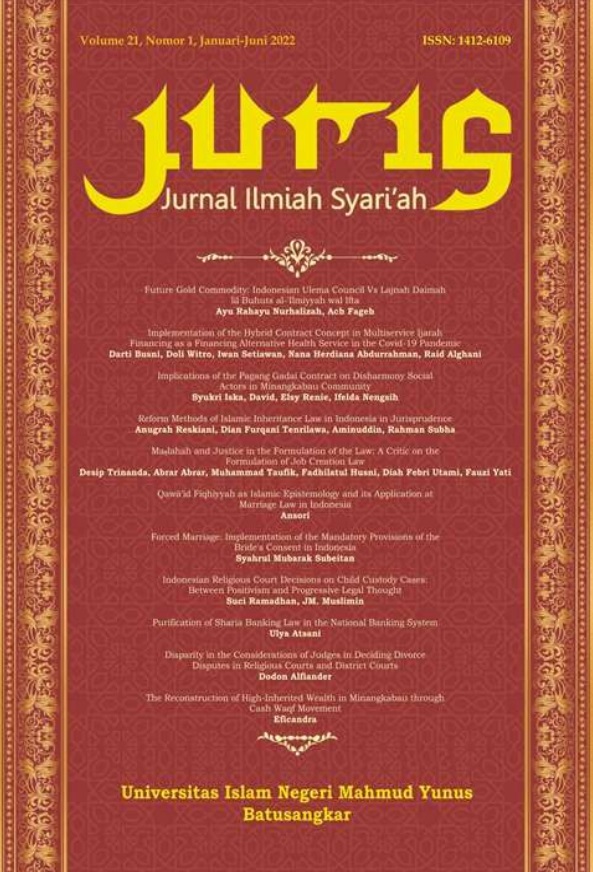Islamic Legal Approach in Preventing Women's Involvement in Spreading Hoaxes on Social Media
DOI:
https://doi.org/10.31958/juris.v23i2.13082Keywords:
Social Media, Women, Hoaxes, Islamic LawAbstract
This article discusses preventing women from being involved in hoaxes on social media using an Islamic legal approach because women are one of the groups that are vulnerable to being exposed to and spreading hoaxes on social media. This research aims to find out how to prevent women from being involved with Islamic law but with an Islamic legal approach. Data was collected with documentation related to analyses by Islamic law experts and the media. Apart from that, interviews were also conducted with female journalists about women's involvement in social media and how to anticipate it, then it was analyzed using a reduction process, presented, and concluded. The results of the research show that the Islamic legal approach can be used as a basis for preventing women from committing hoaxes on social media, if the principles of Islamic law in those media are implemented, among these principles are tabayun, responsibility and always adhering to stick of caution.
References
Agustina, I. F., Ali, Z. Z., Sakirman, S., Octavianne, H., & Jamal, M. (2023). Political Hoaxes in the Post-Truth Era: An Islamic Political Analysis. Al-Istinbath: Jurnal Hukum Islam, 8(2 November), 645–666. https://doi.org/10.29240/jhi.v8i2.8457
Arisandy, D. P., Asmuni, A., & Albani Nasution, M. S. (2022). The Majelis Ulama’s Fatwa on Freedom of Expression On Social Media: The Perspective of Maqashid Sharia. Al-Istinbath : Jurnal Hukum Islam, 7(2), 467–486. https://doi.org/10.29240/jhi.v7i2.5235
Baroudi, S. E. (2023). Ideas that travel: the influence of Abu al-A‘la al-Mawdudi on the political thought of two contemporary Arab Islamists: Yusuf al-Qaradawi and Sayyid Qutb. Politics, Religion & Ideology, 24(3), 377–397. https://doi.org/10.1080/21567689.2023.2277460
Berliyanto, & Santoso, H. B. (2018). Indonesian Perspective on Massive Open Online Courses: Opportunities and Challenges. Journal of Educators Online, 15(1), n1. https://doi.org/10.9743/JEO2018.15.1.11
Carr, C. T., & Hayes, R. A. (2015). Social Media: Defining, Developing, and Divining. Atlantic Journal of Communication, 23(1), 46–65. https://doi.org/10.1080/15456870.2015.972282
Clapp, J. (2022). Social Media and the Collective Unconscious: Archetypal Algorithms and the Colonization of the Psyche. Jung Journal Culture and Psyche, 16(3), 113–131. https://doi.org/10.1080/19342039.2022.2088995
Deliani, N. F., Khairat, N., & Muslim, K. L. (2019). Gerakan Emansipasi Ruhana Kuddus dalam Memperjuangkan Kesetaraan Pendidikan Perempuan di Minangkabau. HUMANISMA : Journal of Gender Studies, 3(2), 170. https://doi.org/10.30983/humanisme.v3i2.1097
Erfina Fuadatul Khilmi, Hafidzah, A., & Praptika Septi Femilia. (2021). The Implementation of Inheritance Dispute Arrangement Based on Local Wisdom in Gayasan A, Jenggawah, Jember Regency. International Journal of Social Science and Religion (IJSSR), 2(1), 77–92. https://doi.org/10.53639/ijssr.v2i1.30
Fadel, M. (2008). The true, the good and the reasonable: The theological and ethical roots of public reason in Islamic law. Canadian Journal of Law & Jurisprudence, 21(1), 5–69. https://doi.org/10.1017/S084182090000432X
Faleh, M. (2021). Law and Vision: A Reading of Islamic Culture and the Socio-Spatial Structure of Traditional Settlements. Australian Journal of Islamic Studies, 6(1), 47–64. https://doi.org/10.55831/ajis.v6i1.315
Faris, N., & Abdalla, M. (2017). Leadership in Islam: Thoughts, processes and solutions in Australian organizations. Springer. https://doi.org/10.1007/978-3-319-66441-5
Gelgel, N. M. R. A., Apriani, K. D., & Ginting, R. T. (2020). Hoaxes: Attacking all Netizen and Putting Women as the Most Vulnerable Group. 510(Icosaps), 201–208. https://doi.org/10.2991/assehr.k.201219.030
Guillaume, A., & Ibn-Isḥāq, M. (1955). The life of Muhammad: A translation of Isḥāq’s Sīrat rasūl Allāh.
Halpern, D., Valenzuela, S., Katz, J., & Miranda, J. P. (2019). From Belief in Conspiracy Theories to Trust in Others: Which Factors Influence Exposure, Believing and Sharing Fake News. In G. Meiselwitz (Ed.), Social Computing and Social Media. Design, Human Behavior and Analytics. HCII 2019. Lecture Notes in Computer Science (pp. 217–232). Springer. https://doi.org/10.1007/978-3-030-21902-4_16
Hamim, K. (2021). Ḥifẓ Al-Lisān as Maqāṣid Al-Sharī’ah Al-Ḍarūriyyah (Its Importance and Relevance in the Contemporary Era). Samarah: Jurnal Hukum Keluarga Dan Hukum Islam, 5(1), 317–337. https://doi.org/10.22373/sjhk.v5i1.9139
Hamim, K., & Abdillah, M. M. (2023). Renaissance of Islam: A Content Analysis of Muhammad Rashid Rida’s Exegesis. Journal of Islamic Thought and Civilization, 13(2), 105–119. https://doi.org/10.32350/jitc.132.07
Hanafi, D., Sabara, S., & Patimah, P. (2024). Social Media Usage Deviation and Impact on Muslim Family Dynamics in Makassar City, South Sulawesi. Samarah, 8(3), 1597–1622. https://doi.org/10.22373/sjhk.v8i3.24113
Hanani, S. (2023). Rancangan Penelitian Sosial Keagamaan (Cetakan Kedua). LP2M IAIN Bukittinggi Press. http://repo.uinbukittinggi.ac.id/1013/
Hopkins, M. (2012). The planetary bargain: Corporate social responsibility matters. Routledge. https://doi.org/10.4324/9781849773201
Ilahi, H. N. (2019). Women and Hoax News Processing on WhatsApp. Jurnal Ilmu Sosial Dan Ilmu Politik, 22(2), 98. https://doi.org/10.22146/jsp.31865
Iskandar, D., Suryawati, I., Suratno, G., Liliyana, Muhtadi, & Ngimadudin. (2023). Public Communication Model In Combating Hoaxes And Fake News In Ahead Of The 2024 General Election. International Journal of Environmental, Sustainability, and Social Science, 4(5), 1505–1518. https://doi.org/10.38142/ijesss.v4i5.856
Jones, M. O. (2019). The gulf information war| propaganda, fake news, and fake trends: The weaponization of twitter bots in the gulf crisis. International Journal of Communication, 13, 27. https://ijoc.org/index.php/ijoc/article/view/8994
Kadeswaran, S., Brindha, D., & Jayaseelan, R. (2020). Social media as a gateway for accelerating women empowerment. Parishodh Journal, 9(III), 4876–4885. https://ir.psgcas.ac.in/id/eprint/131/
Kumar, N., Karusala, N., Ismail, A., & Tuli, A. (2020). Taking the long, holistic, and intersectional view to women’s wellbeing. ACM Transactions on Computer-Human Interaction (TOCHI), 27(4), 1–32. https://doi.org/10.1145/3397159
Lee, A. (2020). Online Hoaxes, Existential Threat, and Internet Shutdown: A Case Study of Securitization Dynamics in Indonesia. Journal of Indonesian Social Sciences and Humanities, 10(1), 17–34. https://doi.org/10.14203/jissh.v10i1.156
Lewis, M. K. (2014). Principles of Islamic corporate governance. In Handbook on Islam and economic life (pp. 243–267). Edward Elgar Publishing. https://doi.org/10.4337/9781783479825.00021
Lim, M. (2017). Freedom to hate: social media, algorithmic enclaves, and the rise of tribal nationalism in Indonesia. Critical Asian Studies, 49(3), 411–427. https://doi.org/10.1080/14672715.2017.1341188
Mahfuh, S. K. B. (2022). Contradictions Of Civil Law With Islamic Law And Its Implication On A Muslim’s Responsibility. Audito Comparative Law Journal (ACLJ), 3(2), 86–92. https://doi.org/10.22219/aclj.v3i2.22799
Muhammadin, F. M., & Wahab, T. K. (2018). Fiqh al-Jihād in Modern Warfare: Analyzing Prospects and Challenges with Reference to International Humanitarian Law. IIUM Law Journal, 26(2), 241. https://doi.org/10.31436/iiumlj.v26i2.406
Nasab, H. E. K., Khoshnit, G., & Hatamizadeh, S. (2023). The Behavioral Pattern of Taghāful in the Social Lifestyle and Its Role in Happiness from the Perspective of the Quran and Hadith. Educational Administration: Theory and Practice, 29(4), 1161–1168. https://doi.org/10.53555/kuey.v29i4.6266
Nawawi, T. T. (2023). Protection of Human Rights According to Islamic Law. Indonesia Law College Association Law Journal, 2(2), 46–52. https://ejournal.psthi.or.id/index.php/ILCALaw/article/view/17
Nazaruddin, N., & Alfiansyah, M. (2021). Etika Komunikasi Islami Di Media Sosial Dalam Perspektif Alquran Dan Pengaruhnya Terhadap Keutuhan Negara. Jurnal Peurawi: Media Kajian Komunikasi Islam, 4(1), 77–91. https://doi.org/10.22373/jp.v4i1.8935
Noureddine, M. (2016). Social media as a new identity battleground. In Political Islam and Global Media (pp. 34–47). Routledge. https://doi.org/10.4324/9781315637129-3
Pakpahan, E., Hoffmann, R., & Kröger, H. (2017). The long arm of childhood circumstances on health in old age: Evidence from SHARELIFE. Advances in Life Course Research, 31, 1–10. https://doi.org/10.1016/j.alcr.2016.10.003
Raković, L., & Dakić, S. (2024). A comparative analysis of social media usage: the case of social media use by USA and Brazilian capital cities. Electronic Government, an International Journal, 20(1), 47–65. https://doi.org/10.1504/EG.2024.135311
Rustan, A. (2021). Digital Communication and Social Media Interaction to Improve Academic Quality of Islamic Higher Education Lecturers. Journal of Social Studies Education Research, 12(4), 144–169. https://jsser.org/index.php/jsser/article/view/3698
Saeed, A. (2014). Reading the Qur’an in the twenty-first century: A contextualist approach. Taylor & Francis. https://doi.org/10.4324/9781315870922
Sarjito, A. (2023). The Influence of Social Media on Public Administration. Jurnal Terapan Pemerintahan Minangkabau, 3(2), 106–117. https://doi.org/10.33701/jtpm.v3i2.3378
Shuhufi, M., Fatmawati, F., Qadaruddin, M., B, J., Yunus, M. M., & Nur, N. M. (2022). Islamic Law and Social Media: Analyzing the Fatwa of Indonesian Ulama Council Regarding Interaction on Digital Platforms. Samarah: Jurnal Hukum Keluarga Dan Hukum Islam, 6(2), 823–843. https://doi.org/10.22373/sjhk.v6i2.15011
Silfia Hanani. (2018). Women’s Newspapers As Minangkabau Feminist Movement Against Marginalization in Indonesia. Global Journal Al Thaqafah, 8(2), 75–83. https://doi.org/10.7187/GJAT122018-7
Susilowati, I., Yunus, N. R., & Zahrotunnimah, Z. (2019). Hoax as Challenge to Democratic Elections in the Context of Honest and Fair Principle. Mizan: Journal of Islamic Law, 3(2), 139–154. https://doi.org/10.32507/mizan.v3i2.502
Toffoletti, K., & Thorpe, H. (2018). Female athletes’ self-representation on social media: A feminist analysis of neoliberal marketing strategies in “economies of visibility.” Feminism & Psychology, 28(1), 11–31. https://doi.org/10.1177/0959353517726705
Tohari, C., Fawwaz, H., & Swadjaja, I. (2022). The Ijtihad Construction Of Islamic Law Based On The Maqâshid Al-Syarî’Ah Approach In The Indonesian Context. Prophetic Law Review, 4(2), 195–221. https://doi.org/10.20885/plr.vol4.iss2.art4
Tuten, T. L. (2023). Social media marketing. Sage publications limited.
Umami, M. (2021). Hubungan intensitas penggunaan media sosial dan self awareness pada remaja Lombok Timur. Universitas Islam Negeri Maulana Malik Ibrahim.
Wahidin, L. O., Hasan, H., Aspin, L. O., & Syukur, L. O. (2024). Islamic Ethics in Social Media: A Study of the Phenomenon of Cyberbullying and Body Shaming. International Journal of Social and Education (INJOSEDU), 1(3), 632–637. https://btqur.or.id/index.php/injosedu/article/view/197
Wahyono, Z., Jani, M. S., & Solihin, S. M. (2019). The Hospitality of Communication in Islam: An Analytical Study on Contemporary Works of Tafsīr. Al-Burhān, 3(1), 38–50. https://doi.org/10.31436/alburhn.v3i1.130.
Yusuf, T., & Aliyu, O. A. (2022). Rudimental Principles of Interaction in The Holy Qur’an: Surah Al-Hujraat as Case Study. El Harakah, 24(1), 41. https://doi.org/10.18860/eh.v24i1.15120
Zaid, B., Fedtke, J., Shin, D. D., El Kadoussi, A., & Ibahrine, M. (2022). Digital Islam and Muslim Millennials: How Social Media Influencers Reimagine Religious Authority and Islamic Practices. Religions, 13(4). https://doi.org/10.3390/rel13040335
Zhang, X., & B. Albarran, A. (2018). Globalization and the Contribution of the Media Economy to a National Economy: A Cross-Country Empirical Study. Journal of Globalization Studies, 9(2), 33–49. https://doi.org/10.30884/jogs/2018.02.03
Downloads
Published
How to Cite
Issue
Section
License
Copyright (c) 2024 Silfia Hanani, Nelmaya Nelmaya, Zakiyah Ulya, Elsa Aldian, Ahmad Yunus bin Mohd Noor, Sitto Rahmana

This work is licensed under a Creative Commons Attribution-NonCommercial-NoDerivatives 4.0 International License.
Authors who publish with this journal agree to the following terms:- Authors retain copyright and grant the journal right of first publication with the work simultaneously licensed under a Creative Commons Attribution License that allows others to share the work with an acknowledgement of the work's authorship and initial publication in this journal.
- Authors are able to enter into separate, additional contractual arrangements for the non-exclusive distribution of the journal's published version of the work (e.g., post it to an institutional repository or publish it in a book), with an acknowledgement of its initial publication in this journal.
- Authors are permitted and encouraged to post their work online (e.g., in institutional repositories or on their website) prior to and during the submission process, as it can lead to productive exchanges, as well as earlier and greater citation of published work (See The Effect of Open Access).








